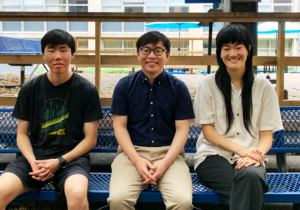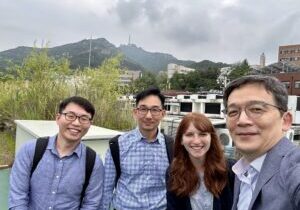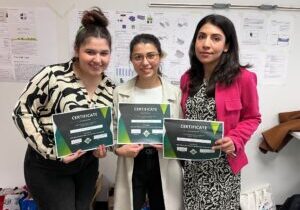
Seungjae Lee
Assistant Professor
Department of Civil & Mineral Engineering
Email: sjae.lee@utoronto.ca
Office: GB228
Tel: 416-946-8408
Building Science
Background
Prof. Seungjae Lee’s research focuses on developing scalable Artificial Intelligence (AI) solutions for building energy systems to improve building energy performance, indoor environmental quality, and grid reliability and resilience. His research pursues seamless integration of building science domain knowledge and data to develop feasible, effective, reliable, and human-understandable solutions. Modern probabilistic machine learning, causal inference, and stochastic optimal control technologies are core tools in his research. Prof. Seungjae Lee’s research interests include optimizing the design and operation of building energy systems and developing effective user interfaces and eco-feedback programs based on a holistic understanding of human-building interactions.
Publications
| Journal Publications |
|---|
| X Liu, S Lee, I Bilionis, P Karava, J Joe, SA Sadeghi (2021). A user-interactive system for smart thermal environment control in office buildings. Applied Energy 298, 117005. |
| L Zhang, M Leach, Y Bae, B Cui, S Bhattacharya, S Lee, P Im, V Adetola, D Vrabie, T Kuruganti (2021). Sensor impact evaluation and verification for fault detection and diagnostics in building energy systems: A review. Advances in Applied Energy, 100055. |
| D Lee, N He, S Lee, P Karava, J Hu (2021). Simulation Studies on Deep Reinforcement Learning for Building Control with Human Interaction. arXiv preprint arXiv:2103.07919. |
| SA Sadeghi, S Lee, P Karava, I Bilionis, A Tzempelikos. (2020). A smart and less intrusive feedback request algorithm towards human-centered HVAC operation. Building and Environment 184, 107190 |
| S Lee, P Karava (2020). Towards smart buildings with self-tuned indoor thermal environments–A critical review. Energy and Buildings 224, 110172 |
| P Im, Y Bae, S Lee, JR New (2020). Empirical Validation of Multi-Zone HVAC System Model: Evaluation of Existing Infiltration Models used in Building Energy Simulation. Oak Ridge National Lab.(ORNL), Oak Ridge, TN (United States) |
| P Im, Y Bae, B Cui, S Lee, S Bhattacharya, V Adetola, D Vrabie, L Zhang (2020) Literature Review for Sensor Impact Evaluation and Verification Use Cases-Building Controls and Fault Detection and Diagnosis (FDD). Oak Ridge National Lab.(ORNL), Oak Ridge, TN (United States) |
| S Lee (2019). DEVELOPMENT OF SELF-TUNED INDOOR THERMAL ENVIRONMENTS. Purdue University Graduate School |
| S Lee, P Karava, A Tzempelikos, I Bilionis. (2019) Integrating occupants’ voluntary thermal preference responses into personalized thermal control in office buildings. Journal of Physics: Conference Series 1343 (1), 012138 |
| S Lee, J Joe, P Karava, I Bilionis, A Tzempelikos (2019). Implementation of a self-tuned HVAC controller to satisfy occupant thermal preferences and optimize energy use. Energy and Buildings 194, 301-316 |
| S Lee, P Karava, A Tzempelikos, I Bilionis (2019). Inference of thermal preference profiles for personalized thermal environments with actual building occupants. Building and Environment 148, 714-729 |
| D Lee, S Lee, P Karava, J Hu (2018). Simulation-based policy gradient and its building control application. 2018 Annual American Control Conference (ACC), 5424-5429 |
| D Lee, S Lee, P Karava, J Hu. (2018). Approximate Dynamic Programming for Building Control Problems with Occupant Interactions. 2018 Annual American Control Conference (ACC), 3945-3950 |
| J Xiong, A Tzempelikos, I Bilionis, NM Awalgaonkar, S Lee, I Konstantzos (2018). Inferring personalized visual satisfaction profiles in daylit offices from comparative preferences using a Bayesian approach. Building and Environment 138, 74-88 |
| SA Sadeghi, S Lee, P Karava, I Bilionis, A Tzempelikos. (2018). Bayesian classification and inference of occupant visual preferences in daylit perimeter private offices. Energy and Buildings 166, 505-524 |
| J Xiong, S Lee, P Karava, AT Tzempelikos (2018). The Influence of Lighting Conditions, Shading Patterns and Weather on Occupant Visual Preferences in Perimeter Building Zones (CH-18-C036). ASHRAE 2018 Winter Conference |
| S Lee, P Karava, AT Tzempelikos, I Bilionis. (2018) Inference of Thermal Preference Profiles for Personalized Thermal Environments (CH-18-C021). ASHRAE 2018 Winter Conference |
| S Lee, P Karava, A Tzempelikos, I Bilionis. An Efficient Method for Learning Personalized Thermal Preference Profiles in Office Spaces. https://docs.lib.purdue.edu/ihpbc/326/ |
| D Lee, S Lee, P Karava, J Hu. (2018) Simulation-based approximate policy gradient and its building control application. https://docs.lib.purdue.edu/ecetr/490/ |
| J Xiong, S Lee, P Karava, A Tzempelikos. (2017). Personalized visual satisfaction profiles from comparative preferences using Bayesian inference. Energy Procedia 122, 547-552 |
| S Lee, I Bilionis, P Karava, A Tzempelikos (2017). A Bayesian approach for probabilistic classification and inference of occupant thermal preferences in office buildings. Building and Environment 118, 323-343 |
| S Lee, I Bilionis, P Karava, A Tzempelikos (2016). A Bayesian Approach for Learning and Predicting Personal Thermal Preference. 4th International High Performance Buildings Conference at Purdue |
| J Xiong, S Lee, A Tzempelikos, P Karava (2016) Adaptive Personalized Shading Control Strategies To Maximize Occupant Satisfaction While Reducing Lighting Energy Use In Buildings. 4th International High Performance Buildings Conference at Purdue |
| SJ Lee, CY Kim, DS Kim (2012). Domestic and Foreign Research Trends of BEMS Assisted On-going Commissioning Technology. Winter Annual Conference of the Society of Air-Conditioning and Refrigerating Engineers of Korea |
| S Whang, MY Jeon, SJ Lee, T Kim, SB Leigh (2012). The effects of ground cover and shading on an outdoor thermal environment in an apartment complex. International Journal of Sustainable Building Technology and Urban Development |
| J Haw, SJ Lee, T Kim, S Leigh (2011) Analyze the building thermal environment by BES-CFD simulation coupling method. Autumn Annual Conference of The Architectural Institute of Korea 31 (2), 425-426 |
| SJ Lee (2011) Effect of natural ventilation through the double-window system on indoor thermal environment in residential building. Yonsei University |
| SJ Lee, CH Cheong, S Hwang, T Kim, SB Leigh (2010). Evaluation of the Indoor Thermal Comfort in Naturally Ventilated Apartment During Summer. Journal of the Korea Institute of Ecological Architecture and Environment 10: 4 |
| JY Lee, CH Cheong, SJ Lee, SK Jung, SH Bae, T Kim, SB Leigh (2010). Analysis of Cooling and Heating Loads According to the Façade Types for a High-rise Residential Building. International Conference on Sustainable Building Asia SB10 SEOUL, 467-472 |
| SJ Lee, CH Cheong, JY Lee, SH Bae, T Kim, SB Leigh (2010) A Comparative Study on the Potential of Natural Ventilation in Summer. International Conference on Sustainable Building Asia SB10 SEOUL, 473-478 |






